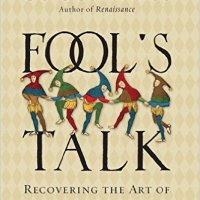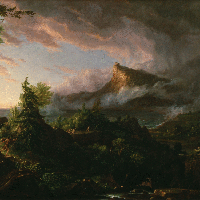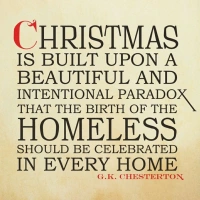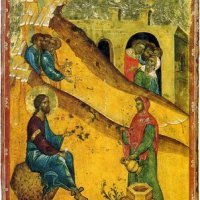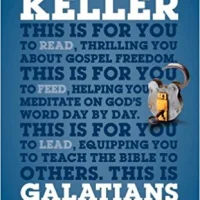 There’s a chapter in the OT where Moses lists miscellaneous laws for Israel. One says, “you shall not muzzle an ox when it is treading out the grain” (Dt 25:4) Fair enough. But in the NT Paul quotes that verse to argue it’s not primarily for oxen that God is concerned. In terms of the applied spiritual meaning, God wants the farmer (worker) to plow and thresh in hope of sharing in the crop (fruit of his labor; 1 Cor 9:9-10). Thank God, because like farming, life is hard enough without getting to enjoy the job perks along the way.
There’s a chapter in the OT where Moses lists miscellaneous laws for Israel. One says, “you shall not muzzle an ox when it is treading out the grain” (Dt 25:4) Fair enough. But in the NT Paul quotes that verse to argue it’s not primarily for oxen that God is concerned. In terms of the applied spiritual meaning, God wants the farmer (worker) to plow and thresh in hope of sharing in the crop (fruit of his labor; 1 Cor 9:9-10). Thank God, because like farming, life is hard enough without getting to enjoy the job perks along the way.
Life can be really hard because work is painful and toilsome. In this sin-cursed world is there any rest and relief I can enjoy from my labors when it feels like I’m barely making ends meet? Am I destined to always be a lowly worker scraping by only to enrich others, but never having my portion enlarged? Surely the Israelites in the wilderness were asking such questions. But they weren’t the first. These fears had earlier occurred to Israel’s (and our) forefathers in the faith: Noah and his sons. In Genesis 9:18-29 we learn:
The account of Noah ends with an origin story of earth’s dispersed peoples. National destinies are forged when Noah renders judgment for each son’s response to his drinking wine and disrobing to lay in his tent. Enjoy rest and relief from our painful toil first won by Noah and finally by Christ our true Man of Rest.
In terms of the length of his story (four chapters), Noah is the first major character in Genesis after Adam. This last episode gathers together and concludes the themes of Noah’s life, while at the same time foreshadowing the full scope of Scripture’s unfolding drama of worldwide redemption.
Setting the Scene: The Man of the Soil
Noah’s fruitful family will be dispersed to fill the whole earth (vv. 18-19, 28-29; cf. Gen 10)
Moses sets the scene with a reminder of the post-Flood world’s first family. Noah has three sons: Shem, Ham, and Japheth. These are Noah’s only sons as the Table of Nations genealogy in Genesis 10 indicates. So every person born henceforth is descended from one of Noah’s three sons with their wives. Having only three sons and no daughters is not many children to begin populating the earth (vv. 28-29 do not acknowledge “other sons and daughters” born to Noah as do prior genealogical summaries). But Noah’s family proved prolifically fruitful as will become clear in the next chapter. In verses 28-29, Noah’s lifespan is recorded as 950 years! Only Methuselah and Jared lived longer—when Noah finally died he was old and full of fruitful years.
In verses 18 and 19 before the last Noah story begins, the narrator inserts two hints that foreshadow key features of Israel’s OT history. First is the parenthetical comment that Ham was the father of an as-yet unknown biblical character: Canaan. Canaan will figure prominently in Noah’s pronouncement in verse 25, and the infamous Canaanites will settle in the land God will later promise to the patriarchs as their future inheritance.
Second is the idea that all people will eventually be dispersed (scattered) over the whole earth. In the pre-Flood world, human civilization was localized to the land of Eden in Mesopotamia, but that will change in the new world. Genesis 11 will provide the backstory on the worldwide dispersion of humanity when God divided them into ethnic-geographic nations.
So in these first two verses Moses drops two tiny breadcrumbs that preface the last origin story from the primeval world which will transition the reader to the patriarchal world inhabited by the rest of Genesis’s main characters: Abraham, Isaac, Jacob, and Joseph.
Noah got drunk on wine from his fruitful vineyard and lay uncovered in his tent (vv. 20-21)
So Canaan and the worldwide human dispersion are the foreshadowed backstory for the last Noah episode. Then the story begins. It says Noah began to be a farmer, a “man of the soil.” The Hebrew word for “soil” sounds like Adam and is also translated “ground,” “earth,” or “dirt”. Noah is presented as the new Adam who transitions from being a preacher of righteousness and an ark builder (Heb 11:7; 2 Pet 2:5), to a man retired from contentious public life who now quietly works his garden.
Whereas God planted Adam in the garden of Eden, Noah planted a vineyard. Adam ate from his garden’s fruit; Noah drank the wine from his vineyard. From Adam to Noah there is development and progress as humanity matures in exercising the dominion mandate to subdue and steward the earth.
Pay close attention to what these verses actually say so you can rightly connect them to what follows. Many interpreters veer off track by jumping to the conclusion that righteous Noah sinned by getting drunk on wine and passed out buck-naked in his tent, shamefully exposing himself. But to situate this scene with its sparse details in the larger Noah story is to find hard-working Noah finally able to get some rest and enjoy the fruit of his labors in the privacy of his personal quarters.
Although the Bible certainly says drunkenness is a dangerous sin to both flesh and spirit (Ex 21:15; ; Pr 21:17; 23:20-21, 29-35; Isa 5:11-12, 20-24; 28:7; Lam 4:21; Hab 2:15; 1 Cor 6:10; Gal 5:21; Eph 5:18), it also portrays the fermented fruit of the vine as a blessing that makes the heart merry (Num 15:5-10; Dt 14:26; Jdg 9:13; Ps 104:15; Isa 55:1; Lk 22:14-20; Jn 2:1-11). Noah is simply feasting and resting which always entails eating and drinking under the blessing of our Creator God (cf. Gen 43:34; Ex 24:11; Jn 2:1-11).
All that to say Scripture does not comment on Noah’s becoming drunk on his wine this one time despite other Scriptures that link drunkenness and nakedness with shame and sexual immorality (Gen 19:30-38; Hos 2:5). We should conclude, yes, that Noah found himself in an inebriated and compromised position partly of his own making. But no, the sin highlighted in this story is certainly not committed by Noah.
What this shows is the wine and alcohol subject is nuanced in the Bible, so we should also treat it with nuance. My family, and likely yours, has felt the destructive and sometimes deadly results of alcohol abuse. The temptation when something so potent goes so bad is to throw the baby out with the bath water. We must be wise. If someone told you there is a fire burning in the house, you’d want to know if it was in the fireplace, or on the stove, or in the furnace. If the fire is under control, in its proper place, then it can serve as a useful tool that yields joy and blessing. Similarly if wine, beer, or other strong drink are under control, then well and good. But if not, take decisive action to “put out the fire” and “stop playing with matches.”
 That alcohol illustration might be too obvious for most people. If you drink, drink responsibly. But the message has two relevant applications for churches. First, at the Lord’s Supper. Wine is the element Jesus used to symbolize what we drink to remember his blood shed for us. Grape juice only became an option when we discovered technology to prevent the fermentation process. And grape juice only became the popular option during the temperance movement which is a relatively recent historical development. For most of the world today, and for most of church history, the church drank wine together because that’s what Jesus instituted. Wine’s quality of being both bitter and sweet combines the paradoxical nature of Christ’s precious and pure blood. His blood shed was a bitter necessity to atone for sin, and a sweet taste of merriment for the forgiven soul. Many churches respect this nuance in the Lord’s Supper by offering both wine and grape juice in the tray for the sake of balancing faithfulness and sensitive conscience.
That alcohol illustration might be too obvious for most people. If you drink, drink responsibly. But the message has two relevant applications for churches. First, at the Lord’s Supper. Wine is the element Jesus used to symbolize what we drink to remember his blood shed for us. Grape juice only became an option when we discovered technology to prevent the fermentation process. And grape juice only became the popular option during the temperance movement which is a relatively recent historical development. For most of the world today, and for most of church history, the church drank wine together because that’s what Jesus instituted. Wine’s quality of being both bitter and sweet combines the paradoxical nature of Christ’s precious and pure blood. His blood shed was a bitter necessity to atone for sin, and a sweet taste of merriment for the forgiven soul. Many churches respect this nuance in the Lord’s Supper by offering both wine and grape juice in the tray for the sake of balancing faithfulness and sensitive conscience.
The second application is more broad. Let us not cast judgment on believers who are able, without sinning against their conscience, to make, sell, or drink alcohol even if you are not able to do the same. Again, since the Bible teaches us to be nuanced in our attitude toward alcohol use, we must do our best to imitate the nuance of the biblical writers and the characters they write about. Jesus was accused by his teetotaling enemies of being a winebibber because Jesus made wine and drank wine. In fact he made the very best wine to save a wedding host from the embarrassment of running out of it (Jn 2:1-11)! In some Christian subcultures the conviction of total abstinence runs deep and therefore won’t change easily. But the Word of God can reform even the strongest traditions, so we’ll give God time to let his Spirit work on us.
Discerning the Sin: The Man with the Robe
Ham invaded father’s tent, saw him naked, then usurped his royal mantle-robe (vv. 22-23a)
Which brings us to the question of what is the sin highlighted in this passage. Clearly it is Ham’s sin. But what exactly did he do to Noah? Actually there is much debate on this because the story is a little strange and the punishment doesn’t appear at first to fit the sin.
One theory is Ham lusted or committed a homosexual act against his father by uncovering Noah’s nakedness. It’s a common OT euphemism to describe sexual immorality as “uncovering” someone’s nakedness (Lev 18). A second theory is Ham raped his mother which would have also qualified as uncovering his father’s nakedness (Lev 18:7-8). A third theory is Ham castrated his father! All these options view Ham’s sin as sexual in nature, but also such that Ham is exercising dominance over his father’s authority (cf. 2 Sam 16:21-22). An exegetical case can be made for each of these theories, but I think all of them make a fundamental mistake.
Read verses 21-22 carefully and you’ll see it doesn’t say Ham “uncovered his father’s nakedness” which it must say for the three implausible theories to withstand cross-examination. It literally says Noah “uncovered himself” and that Ham “saw the nakedness of this father.” Which is why the best way to discern the sin is to steer away from the sexual arena and focus on Ham’s exercising dominance over his father. Understanding Ham’s sin as rebellion against rightful God-ordained authority makes the most sense of what Ham and his two brothers did.
Here’s what transpired. Without invitation, Ham invaded the private domain of his father, witnessed Noah naked in a drunken sleep, grabbed the patriarch’s symbolic robe of authority, and went to Shem and Japheth to recruit them in his scheme. Where does it say Ham seized Noah’s royal mantle-robe? It’s only a subtle hint that surmises from Noah’s office as the new Adam who serves his family as prophet (speaking the word of the Lord; vv. 25-27), priest (offering sacrifice to the Lord; Gen 8:20), and king (exercising dominion; Gen 9:1-7, 20). The hint is in verse 23 that says the other brothers took “the robe” not just “a robe” (the Hebrew includes a definite article for “the”) to re-cover Noah, strongly implying Ham completed his father’s symbolic disrobing by grabbing the patriarch’s mantle to usurp authority.
As we’ll see, this interpretation makes the most sense of Shem’s and Japheth’s otherwise inexplicable response to Ham’s rebellious deed, and makes the most sense of Noah’s confusing pronouncement to follow.
Shem and Japheth averted their eyes, covered father, then restored his mantle-robe (v. 23)
Shem’s and Japheth’s righteous deed is submission to rightful authority. Think about it. Why was it so urgent for Noah’s righteous sons to take their turn invading father’s tent? Noah’s nakedness is already sufficiently “covered” by the tent as garment. This was no tee-pee or pup tent. Noah’s tent was almost certainly his home, with several rooms. Surely Noah has other garments to clothe himself. Noah must have his sons immediately return his mantle-robe as covering to symbolically restore authority to their father.
Also notice how it says they carried Noah’s robe inside the tent. Why not carry it in hand? Why are two brothers necessary to return the robe? By draping it across their shoulders, the sons function as pillars supporting Noah’s mantle of authority (cf. Ex 17:11-12). Walking backwards with the robe is a key detail for us to discern the sin of Ham. One, Noah is uncovered, so they must avert their eyes so as not to see their father’s nakedness which would bring him shame and dishonor. And two, carrying the robe on their shoulders both returns the robe to its rightful owner and displays loyal submission to their father. Shem and Japheth prove they are not party to Ham’s usurpation and rebellion.
Interpreting the Symbolism: The Man of Our Rest
Bestowed blessing: the Man rendered judgment of enlarged dominion/servitude (vv. 24-27)
Now that we have a good idea of what happened, it’s time to put it all together. Because this passage is full of symbolism and importance. For all that we know about Noah so far in Genesis, he has yet to speak!
As soon as he learns what Ham did to him, his first and only recorded words are an oracle of right judgment. Much like Jacob blessing his 12 sons at the end of Genesis, Noah bestows his blessing (and curse) in the form of rendered judgment based on what he foresees unfolding for the future of his family. God is restoring right judgment to humanity, redeeming the terrible decisions of Adam in the garden and the Cainite Lamech’s boast for killing a young man (Gen 3; 4:23-24). Ham is Noah’s youngest son, so it is poetic justice (eye for eye) that Noah declares Ham’s youngest son Canaan will be cursed. And the rest of the Bible attests it’s true.
Some are troubled that Ham the father did the deed but Canaan the son suffered the punishment. But since the passage is an origin story of nations, Noah has in mind not 2 people (Ham and Canaan) but one people (the Canaanites as one particular nation that will descend from Ham). Why is Canaan singled out from all Ham’s sons? Beside that both Ham and Canaan are both the youngest son of their respective fathers, it appears Noah may have discerned the characteristic sins of Ham (lewdness mixed with rebellion against God) in Ham’s son Canaan. Moses and the Israelites preparing to enter the land of Canaan would have associated the sinful ways of the Canaanites with Ham’s sin against his father Noah. Like father, like son.
Note the nature of the curse on Canaan because it’s also an example of poetic justice. Ham overreached for authority to be master of his father and brothers, so Noah curses Ham’s son with abject servitude to his brothers. Youngest Ham reached for the top, but his youngest will descend to the bottom to be the servant of servants, the lowest ranking servant doomed to be a slave of brother nations. That’s the national curse on the Canaanites.
Conversely the national blessings Noah bestows on Shem and Japheth. Shem is blessed to have the LORD as his God. Because the LORD is blessed above all, so the Shemites will be blessed above all nations. Japheth joined his brother Shem in honoring their father, so Noah also blessed Japheth’s descendants with enlarged dominion, and yet Japheth will not overshadow Shem. Shem’s tents will make room for Japheth such that they will dwell together as peoples. Shem and Japheth have enlarged dominion (the LORD’s blessing of the dominion mandate) while Canaan’s servitude is enlarged as his people have diminished dominion.
Even from the days of Noah, the Bible anticipates God’s blessing of the woman’s seed (the coming Messiah serpent crusher) who will come through the family of Shem with the Japhethites included in the blessing. In rendering right judgment Noah is a forerunner of Jesus Christ, the true Noah who bestows blessing to enlarge the inheritance of all those in his family by faith. The Lord Jesus also bestows the curse to enlarge the punishment on all those who would grasp at his mantle to disrobe and shame and usurp him.
On the cross Jesus bestowed the blessing and the curse. For those who mourned as he endured shame and mocking and nakedness, for those who sorrowfully covered Christ’s body in the tomb, for those who honored him with grave clothes and burial ointments, Jesus enlarged their dominion in his resurrection. As he inherits the whole earth, so do we!
But for all those who hurled public insults at the foot of the cross, encouraging bystanders to joined in the jeering, for all who stripped Jesus down in humiliation, for those who cast lots for his robe as if it weren’t a royal mantle but only the spoils of crucifixion, for these Jesus enlarged their humiliation and shame in his resurrection. Kings and princes who raised their fists against God’s anointed one shrink in fear and defeat (Ps 2).
The only way out of Canaan’s curse is to repent, believe in, and honor God’s Son, the True Noah. Cast your lot with Shem and Japheth so you may be blessed with salvation and righteousness, and not cursed with eternal slavery to sin.
Fulfilled prophecy: the Man brought rest/relief from painful toil (vv. 20-21; cf. Gen 5:29)
Lest we forget what the Noah story is ultimately about, remember his father Lamech’s prophecy about his newborn son. Back in Genesis 5:29 Lamech named his son Noah saying, “Out of the ground that the LORD has cursed this one shall bring us relief from our work and from the painful toil of our hands.” Looking back from the end of Noah’s life, he fulfilled that prophecy.

Father Lamech prophesies and names son Noah
Noah the man named Rest indeed brought rest and relief from our painful toil. How so? Verses 20 and 21 provide one example. Now the earth is not resisting farmers with constant thorns and thistles. Noah planted a vineyard and there is no hint of curse on his ground. His vine yields fruit and his winery yields drink for feasting. Wine, when it’s well-used not ab-used, is a blessing that helps us enjoy our rest from hard labors and relieves us from the aches and pains of the job. It takes the edge off the dreariness that work can be and provides a reason to fully complete our work so we feel a sense of reward for accomplishment. In this way a responsible serving of an alcoholic beverage can bring a measure of relief. So cheers to Noah for his pioneering vineyard and winery! He’s the patron saint of the Sabbath feast.
But also scratch below the surface of the larger Noah story and you’ll find Noah’s life trajectory promises rest and relief from the ravages of a fallen world all around us. How restless the saints in the godly ancestral line before the Flood must have felt living in a society that grew more and more corrupt. As they ministered in a fallen world, God’s people cried out for relief. And behold, through the ministry of righteous Noah, God provided rest and relief after the Flood in the new world. Yes, the seed of the serpent would reappear in Noah’s family, but Noah’s victory of faith and righteousness was a great relief for all who were burdened by sin.
Again Noah is a forerunner of Jesus the True Noah, whose vineyard yields Christians as his vine branches that bear much spiritual fruit. Jesus labored to save his people as a preacher of the gospel, was baptized on the cross as his trial by ordeal, and rose again to eternal life to enter his forever Sabbath Day rest. He invites us into his heavenly tent to eat bread and drink wine together. Taste a sample of firstfruits wine until the last day when we will feast on the harvest fruit at the table of the Lord.
The faith lessons from Noah’s story are surprisingly transportable to the Christian life. How is that since he lived so long ago? Because like Noah, we also straddle two worlds. Before God destroyed the old world with the Flood, Noah’s experiences mirror our own. Bible scholar and author James Jordan sums up Noah’s life well.
The story of Noah is a comfort for Christians today. Faced with ungodliness on every side, we do not have rule or dominion. We live in a time of prophecy and Ark-building, warning the wicked and building the Church. In time, however, God will destroy the wicked, either through plague or conversion, and give rule to His people. The wine we drink in Holy Communion and the robes our church officers wear are our pledge that this is so. Like Noah, we must never shrink from our duty.
We yearn for rest and relief from the sin around us and inside us. We struggle to balance the duties to be in the world but not of it, to share the gospel like Jesus and Noah did, not from on high, but with our feet on the same ground as everyone else. And to also walk in holiness by keeping ourselves unstained by the world. We walk by faith knowing we are citizens of a new world where righteousness dwells, but we won’t enter that kingdom without walking through the flood with Jesus.
In this world we practice rest and give thanks for periods of relief from our painful toil. The Christian works to rest, and rests to work, with work’s purpose to achieve some measure of creational dominion so we might share in the enlarged fruit of our labors. We work and rest and feast as rhythms of life with the new world on the horizon where Jesus our Savior awaits. Submit to his Lordship. Revere him for his mantle-robe dipped in his own sacrificial blood shed on the cross. Trust in him, and by his and our resurrections we’ll get to the Promised Land. Amen.
Resources
Sermon handout & Genesis 9:18-29 commentary
Sermon audio download



